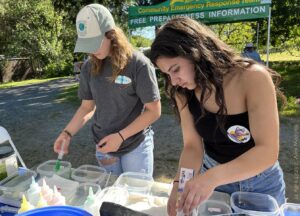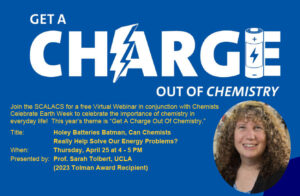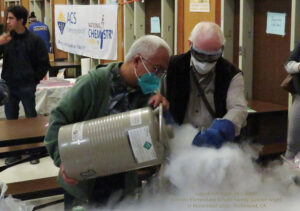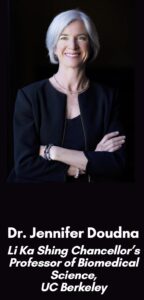Calendar

Celebrating John Muir’s 186th birthday
and the 54rd Anniversary of Earth Day
Cal ACS will be there with hands-on chemistry, featuring the 2024 Earth Week theme,
Get a Charge out of Chemistry
Recárgate con la Química
The California Section will join numerous other community and educational organizations for the return of this Earth Day celebration to Martinez. Look for the Cal ACS canopy, where visitors will discover how to build a battery like the one Alessandro Volta invented in 1799. They can also try splitting water by electrolysis, using electricity from photovoltaic panels. And, they can make their own UV light-detecting bracelet using photochromic beads.
If you can help out at the ACS booth, please contact Sushila Kanodia. See you there!


This is a free-to-all virtual event. To register, CLICK HERE.

About the webinar:
This talk explores how materials chemistry can help address challenges in improving our energy security and efficiency. Using chemically synthesized nanoporous materials as our building blocks, we will see how these ‘holey’ materials can help solve problems ranging from grid-level energy storage for renewable energy to fast-charging batteries for vehicle electrification to building efficiency.
We begin with an introduction to battery technology and then consider how nanoporous materials can improve battery performance. We first focus on a family of fast-charging materials known as pseudocapacitors. When conventional electrode materials are synthesized in nanoporous form, they can be used to produce batteries that charge much faster than those made with conventional bulk materials. This arises because of a very desirable combination of electrical connectivity throughout each porous grain, liquid electrolyte access to the interior of the material, and short solid-state ion diffusion lengths within the walls of the nanoporous network. In some materials, the nanoscale wall dimensions can also suppress intercalation-induced phase transitions, further improving kinetics. Nanoscale porosity can also help increase stability in other types of battery electrodes, particularly those that have large volume changes upon cycling.
Focusing on high-capacity alloy anodes, we show that nanoscale porosity can help mitigate structural degradation due to volume changes. Finally, we consider how porous materials can be used as insulation to improve building efficiency. Here we focus on both optically clear porous materials that can be used for window insulation, and on materials with strong infrared emission that can be used for passive daytime radiative cooling.
About the speaker:
Sarah H. Tolbert is a Distinguished Professor in the Departments of Chemistry and Biochemistry and Materials Science and Engineering at UCLA. Her research focuses on controlling nanometer-scale architecture in solution-processed nanomaterials to generate unique optical, electronic, magnetic, structural, and electrochemical properties. She has published over 200 scholarly research articles and has 20 patents focusing on electrochemical energy storage, organic electronics, nanomagnetics, nanoscale control of thermal conductivity, and new ultra-hard materials.
She also serves as the faculty director for a program aimed at bringing nano-concepts to schools, students, and the general public throughout the greater LA area. Professor Tolbert is the recipient of a number of awards including the American Chemical Society Henry H. Storch Award in Energy Chemistry, a Fellow of the Royal Society of Chemistry, an NSF Special Creativity Award, the ACS R.A. Glen Award, and the UCLA Diversity, Equity, and Inclusion Award. She directs the DOE Energy Frontier Research Center on Synthetic Control Across Length-scales for Advancing Rechargeables (SCALAR).

On Thursday, May 2nd, Willard Middle School will host Family Science Night, an evening of colorful demonstrations and hands-on chemistry, presented by the local California Section of the American Chemical Society. The entire Willard Community is cordially invited!
Join us at 6 PM in the Multi Purpose Room for exciting chemical demonstrations. We’re celebrating Earth Week this year with theme, “Getting A Charge Out Of Chemistry,” and visitors will have the chance to recreate Alessandro Volta’s original 1799 voltaic pile. Pick up your event program and visit each of the activity stations for plenty of hands-on science, before returning to the MPR for prizes and Liquid Nitrogen Ice Cream. Collect your souvenir Periodic Table and copies of Celebrating Chemistry, with instructions for a variety of safe, hands-on activities that you can try at home.
Please contact Michael Cheng if you would like to join our volunteer team and help out at this event!


